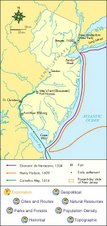After the British took over in 1664, English settlers who established the New Jersey colony encouraged African slavery so they could open up the land for agriculture and trade. Slavery was made legal under the government that was ruling at the time. In 1702 a governor from London was sent to New Jersey to "keep the settlers supplied with valuable Negroes at fair prices." These instructions became policy, and slave trade became an important part of the economy.
In 1774 the Provincial council rejected a proposed slave tax, and said that nothing would be allowed to interfere with importing slaves. By 1690 most people in colonial New Jersey owned one or more slaves. By 1738 New Jersey's slave population grew to about 4000.
From 1713 to 1768 the colony had a separate court for slave crimes. Slaves were forbidden any firearms. Also slaves could not assemble or be in the streets at night. The punishment for the slaves who commited crimes were much more severe, usually death. In 1735 a slave who tried to set a house on fire was burned at the stake.
Even free Africans were not treated fairly. Free Blacks in colonial New Jersey were not allowed to own land.
Subscribe to:
Post Comments (Atom)


No comments:
Post a Comment